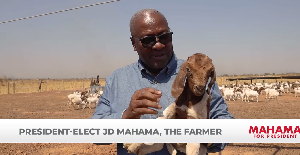Sunyani (B/A) July 16, GNA - Mr. Kwaku Agyemang Manu, Deputy Minister of Finance and Economic Planning has called on the Brong-Ahafo Regional Office of the Valued Added Tax (VAT) Service to monitor and assess the turnover of chop bar operators in the region.
He said this would help determine whether the turnovers were appropriate to the threshold of the Service towards VAT registration. Mr. Manu was interacting with some officials of the VAT service and Mrs. Josephine Brobbey, Proprietress of 'Good Mark' Chop Bar in Sunyani over the latter's publicized refusal to register for VAT. He noted that some chop-bar operators in the region had inadequate knowledge about the VAT registration and called on the regional office of the Service to mount an intensive education to help chop bar operators become abreast with the laws of the Act.
Mr. Samuel Sackey, Deputy Brong-Ahafo Regional head of VAT Service said ACT 546 of VAT "does not allow assessing turnovers and threshold of service providers but rather retailers."
He said the national headquarters of VAT Service had decided to meet national and regional executives of Ghana Traditional Caterers Association on the VAT issue.
Meanwhile Mrs. Brobbey has decided not to register with the VAT Service "since my chop bar has not reached the level to register with it."
Following her refusal to register for the VAT, the Brong Ahafo regional office of the Service took Mrs. Brobbey to court, but this generated a furore that led to both the national, regional executives and members of the Ghana Traditional Caterers Association threatening to embark on a demonstration at the precincts of the court in Sunyani last Wednesday.
The Regional office of the Service, however timely withdrew the case from the court, saying its national headquarters wanted the matter to be settled out of court.
In solidarity with their colleague, some chop bar operators in Sunyani last Wednesday refused to operate and this sent many people, mostly workers going hungry.
The boycott was however, not very significant as the 'waakye' sellers, plantain roasters and other small-scale operators were adamant and provided food for sale.
Click to view details



Business News of Saturday, 16 July 2005
Source: GNA
















